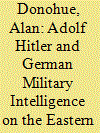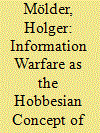| Srl | Item |
| 1 |
ID:
160748


|
|
|
|
|
| Summary/Abstract |
This article primarily examines the work conducted by the intelligence service of the German Army known as Fremde Heere Ost [Foreign Armies East, FHO] and the influence it had on the strategic and operational decision making of Adolf Hitler in the southern sector of the Eastern Front in 1942. Using mainly archival material, FHO estimates of Soviet formations in terms of their deployment areas and strengths during Operations Blau and Edelweiβ are discussed. The FHO organization and Hitler’s own thoughts on military intelligence are also outlined in brief. The article shows that a persistently and excessively optimistic depiction of the supposedly wretched state of the Soviet armed forces by German military intelligence convinced Hitler of the correctness of his decision to resume the offensive in summer 1942 and later to attempt to capture simultaneously his objectives of Stalingrad and the Caucasus oilfields.
|
|
|
|
|
|
|
|
|
|
|
|
|
|
|
|
| 2 |
ID:
160749


|
|
|
|
|
| Summary/Abstract |
While the myth of the ‘clean Wehrmacht’ has long been debunked in academic circles, one of the problems in changing the popular perception has been online representations, such as Wikipedia. Here many (but by no means all) contributors to pages about the Wehrmacht tend to divergent from prevailing trends in current (especially German) historiography. There is also sometimes a clear lack of historical training in evaluating sources and understanding the need for contextualization. The article seeks to show why students must always evaluate the process behind the generation of information and engage critically with what they read on Wikipedia (or preferably avoid it in favor of peer-reviewed literature).
|
|
|
|
|
|
|
|
|
|
|
|
|
|
|
|
| 3 |
ID:
160747


|
|
|
|
|
| Summary/Abstract |
The V4 or Visegrad countries — the Czech Republic, Hungary, Poland, and Slovakia — have turned to the West for many reasons, including in order to advance technologically and economically, for political and administrative models, as well to gain military and political protection. The V4 countries are aware that their active and successful engagements within NATO and the EU are only possible in close cooperation with Germany. The V4 countries and Germany have had many opportunities to develop their mutual cooperation in the sphere of defense. However, defense cooperation seems to be underdeveloped within the forum of the V4 states as well as with Germany. The V4 platform clearly remains an unattractive tool for German military cooperation with Central European countries and has shown very limited potential even for its members. Germany does not have high expectations for the V4 alliance in terms of relevance as a security institution.
|
|
|
|
|
|
|
|
|
|
|
|
|
|
|
|
| 4 |
ID:
160746


|
|
|
|
|
| Summary/Abstract |
The rise of hybrid warfare has led the Russian government to actively develop its information warfare capabilities, including the weaponization of digital media. To garner the support of Russian speakers at home and abroad for its foreign policy endeavors, the Kremlin requires that state-backed media provide favorable and increasingly digitized coverage of Moscow’s initiatives in former Soviet territories. This study examines how the Kremlin developed its ability to weaponize Russian-language digital news media over the past decade. Employing quantitative and qualitative content analysis, it examines Russian-language digital news articles published by pro-Kremlin media outlets during two events — the 2008 Russo-Georgian War and the 2014 Crimean annexation. My results show that from 2008 to 2014 Moscow improved its ability to capitalize on the unrestricted publication space that digital news affords, with the 2014 content sample more thematically sophisticated and potentially more persuasive.
|
|
|
|
|
|
|
|
|
|
|
|
|
|
|
|
| 5 |
ID:
160745


|
|
|
|
|
| Summary/Abstract |
Vladimir Putin’s regime in Russia has re-established borderlines between the East and the West and sees the world in terms of conflict with the West. Political and military tools used by Russia in this confrontation may vary. Since 2013, Russia has started to develop a non-linear approach to military strategy, in which the difference between ‘wartime’ and ‘peacetime’ disappears and permanent warfare may become the normal form of relationship between states as described for society by the English philosopher Thomas Hobbes in his works of the 17th century. Information warfare forms an influential part of this non-linear strategy. The Russian information warfare machine is quite flexible and easily adaptable to new situations. The conflict in the Ukraine has become a proving ground, where the techniques and tools of information warfare have been actively tested.
|
|
|
|
|
|
|
|
|
|
|
|
|
|
|
|